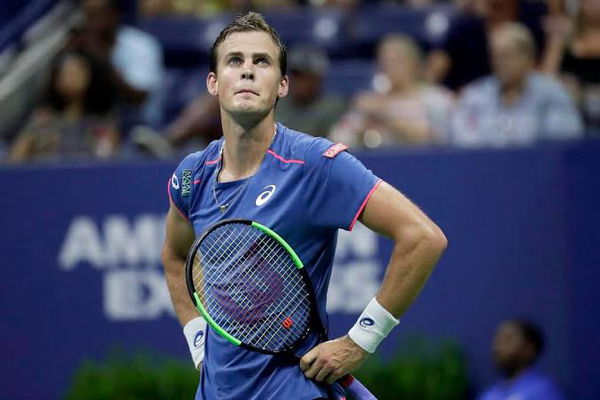

Former World No. 25, Vasek Pospisil is a member of the 12 member ATP Player Council since 2018. Vasek Pospisil has been fighting to ensure that tennis players get their fair share since he joined the ATP Player Council, which is headed by Novak Djokovic. He believes that tennis players are vastly underpaid and tennis needs to change if it wants to restore its fairness and transparency.
The 29-year-old wrote to The Globe and Mail, a Canadian newspaper, showing the dark side of tennis and his perspective on tennis players getting less share in terms of prize money as compared to the other sports.
ADVERTISEMENT
Article continues below this ad

When Vasek Pospisil joined the ATP Tour, he began to hear from the older, more experienced players on the tour about the greed, power and total control that the major tournaments have over players. He wrote, “I started to look at things differently and began noticing the business meetings and whispers of huge deals made behind the scenes.”
Pospisil then decided to run for the 10-member ATP Tour’s Player Council and a year ago, got elected. However, after joining the ATP Player Council, Vasek Pospisil couldn’t believe the things he was hearing and was outraged by the realities of the Tour.

He continued, “I wanted to try to effect change. I was angered by the lack of substance and information at the ATP’s Player Council meetings, where all the top players of the tour are present. I wanted to do something, but mainly, I wanted to know more.”
The Canadian also revealed that Grand Slams give only 14 percent (7 percent to men’s side and 7 percent to women’s side) of the revenue back which is much lower than compared to other sports. He said, “I wanted to know why Grand Slam events only give 14 percent of the revenue back to the athletes when most other professional sports of comparable size are near or above the 50-per-cent mark.”

He further added, “Tennis has the lowest revenue sharing of all professional sports that have become a global business. Even the percent is not an audited figure. This number could, potentially, be quite a bit less.”
“This low revenue share, in turn, means only a handful of tennis players can make a good living in a sport that makes billions of dollars and in which athletes have perhaps the highest out-of-pocket expenses compared with other sports,” Vasek Pospisil said.

The top 50 players on the ATP Tour make a great living. Vasek Pospisil also suggested that he makes a healthy living, for which he is grateful. However, most players outside the top 100 are either losing money or breaking even when you add up the personal and staff expense for a season.
The 29-year-old further explained and compared the NHL with tennis. He said, “By way of comparison, in 2018, the men’s singles players that finished the year ranked 51 to 100 made an average of US$583,235 before taxes and heavy expenses. In the NHL last season, there were more than 450 players who made more than US$1-million. The revenue share in the NHL is percent. Plus their expenses are covered.”

Vasek Pospisil further took a dig at the ATP Tour board for not providing the money to the players that they deserve. “The tennis money is there, the players deserve it, but they’re not getting it. One reason is the governance structure of the ATP. The ATP Tour board – the governing body of the men’s pro-tennis tours, with the exception of the four Grand Slam tournaments – has three player representatives and three tournament reps.”
However, nothing changes as all the major issues that get voted on end in a 3-3 tie. Pospisil continued, “It’s quite a bit more complex as you can imagine and, unfortunately, I don’t have the word count to get into all the details.”
He later suggested that the players have absolutely no power to change anything in the Tour. “The governance structure is a very effective tool for tournaments to maintain their monopoly and complete control of the ATP, with the players having nearly no power to change matters that affect their livelihoods.”

The Canadian feels that no other professional sport or organization is structured in such a chaotic way. Pospisil also perceive that the ATP structure ultimately leaves the players powerless and feels if tennis players can form a union, similar to what other major sports have?
However, the Canadian knows that it is very difficult as he revealed that the governing body of tennis does not let any player movement to unite. He continued and said, “If only it were that simple. But it’s important to know that the major governing bodies of tennis are completely against any player movement to unify.”

It’s natural for players to think they are getting mistreated when they are denied the ability to see the financials of the events they play in, and when they are not given details of deals made behind the scenes. Vasek Pospisil furthermore disclosed, “In one major deal, the players were intentionally left in the dark and our board representatives were asked to keep it that way.”
Vasek Pospisil believes that a players’ union would certainly help balance the scales by giving the players a more effective voice, a legal voice, in negotiations about revenue sharing for tournaments and for the Grand Slams.

ADVERTISEMENT
Article continues below this ad
“We’re constantly told that we must “trust” the tournaments and that this is a “partnership.” Except this is business. The players are given the bare minimum of what the governing bodies feel will avoid a revolution or an extremely angry group of players,” the Canadian said.
“The goal for the ATP, in order to avoid unrest in its otherwise well-run and controlled empire, is to give the players only what they need. Still, there is a history of player unrest on the Tour,” he said. “In 2012, almost all the players wanted to boycott the Australian Open. Because of this pressure, there were prize-money increases from the Grand Slams in recent years.”
ADVERTISEMENT
Article continues below this ad
Pospisil wishes to make the sport more transparent and fair. “What I wish for, and what I am working for, is for there to be a balance of power on both sides so that true negotiating can happen. I would like both the players and the tournaments to come to the table, make their arguments and come to compromises they can mutually benefit from. What I’m advocating for is fairness and transparency, nothing more.”
ADVERTISEMENT
ADVERTISEMENT
ADVERTISEMENT
ADVERTISEMENT

